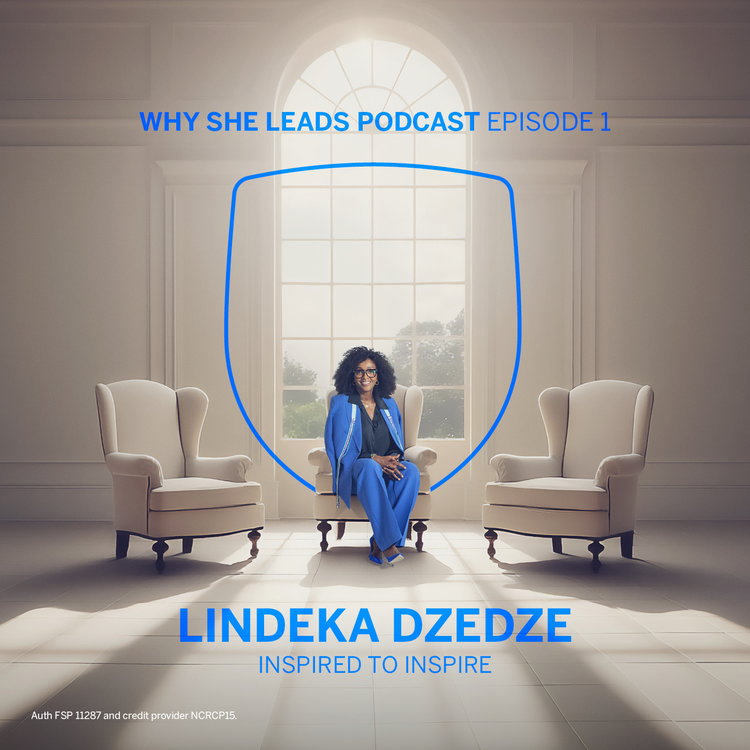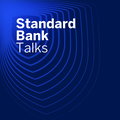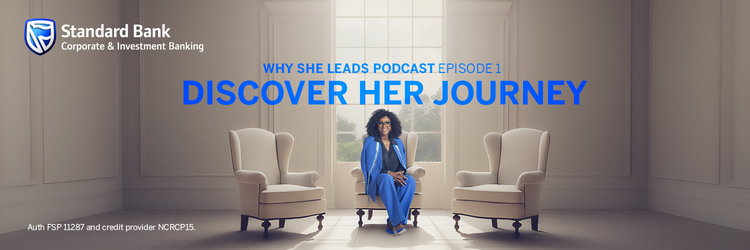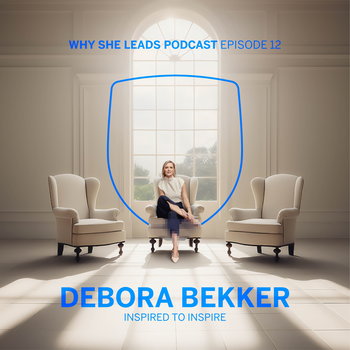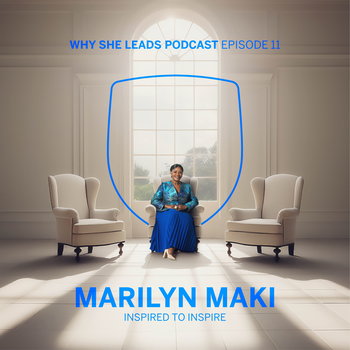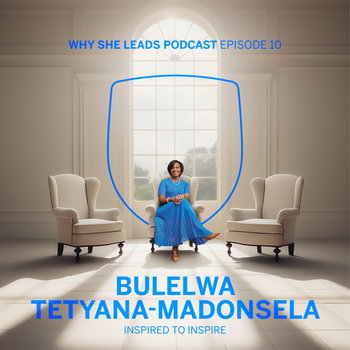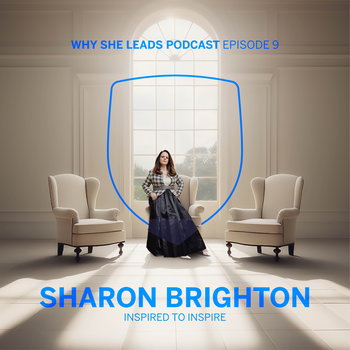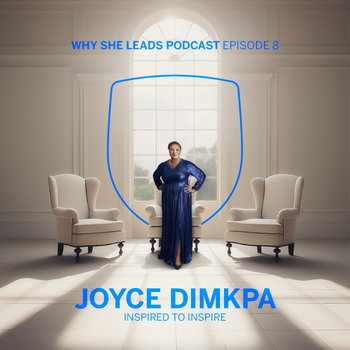00:10:
Hello, and welcome to the Standard Bank CIB
00:13:
Why She Leads podcast.
00:15:
My name is Nzinga Qunta,
00:16:
and I'm so pleased to be hosting conversations
00:19:
with some of the most successful deal makers
00:21:
inside Standard Bank CIB.
00:23:
The women that we are interviewing really are changing the face of banking
00:27:
and what it means to be an investment banker with an innovative and fresh thinking.
00:32:
Joining me today,
00:34:
Executive Head of Strategic Partnerships
00:35:
at Standard Bank Group,
00:36:
Lindeka Dzedze,
00:37:
thank you so much for your time
00:39:
on Why She Leads today,
00:40:
So excited to speak to you.
00:42:
Whenever people speak to you,
00:44:
the one thing that you're so proud of
00:46:
is where you come from and how that shapes you,
00:49:
Tell us about that.
00:50:
Thank you Nzinga for having me.
00:54:
I often introduce myself as
00:59:
a child from the dusty villages of the Eastern Cape,
01:03:
but a proud child of Africa.
01:06:
I think I'm proud of my roots
01:08:
I think I'm proud of my roots
01:08:
because of the people that have raised me and the sacrifices that they've made
01:14:
and also the talent that comes from the most unexpected places,
01:19:
especially in the world of today, where the expectation is that
01:23:
for those that succeed, I probably would have had to go onto
01:29:
expensive private schools, have come out
01:32:
from Ivy League universities overseas
01:35:
and also expected to speak the Queen's English.
01:39:
I like the element of surprise of knowing that actually
01:42:
we come in all shapes and sizes and people from everywhere
01:46:
actually have a chance to succeed.
01:49:
It's not an easy route though,
01:51:
If you're saying
01:52:
coming from the dusty villages or from a township,
01:56:
if you don't have a lot of resources behind you to make it up
02:00:
to be the Executive Head of Strategic Partnerships
02:03:
or similar positions, what's that journey like?
02:06:
I guess firstly, to get to university, it is a struggle
02:11:
in terms of you have to, you uproot yourself from the rural areas
02:15:
to the metropolitan areas where the universities are.
02:17:
Often times you have to look for resources financially to be able
02:21:
to afford your education.
02:23:
And I guess in my space when I started, there were no internships
02:27:
or graduate programmes, and back in the day, there was no BEE,
02:31:
so you didn't have to employ someone like me.
02:34:
So you have to make it happen for yourself.
02:37:
I guess I always say from every hardship that I've gone through,
02:41:
there's been learnings that I've actually used them
02:44:
as a stepping stone to where I am,
02:46:
So I went to university in KZN, and I first worked there in tourism.
02:52:
I enjoyed it very much.
02:54:
I get tipped in foreign currency, at the time
02:58:
I don't think there was any regulation at the time in terms of certificates,
03:03:
they came after.
03:04:
I'm telling my age now,
03:06:
so I enjoy meeting people, I enjoy talking to people, I enjoy learning,
03:10:
and you get exposure to people from across the globe,
03:12:
from across different cultures.
03:14:
It was a big,
03:17:
enjoyable experience for me and it opened up my world.
03:21:
Moved to Johannesburg, while I was starting,
03:24:
I got exposed to, I guess, financial markets
03:27:
and that was of big interest to me, especially if you realise if you look at
03:31:
who controls the power or who gets to make the decisions.
03:34:
And at the time,
03:36:
you know, we were still very much in the early stages of our democracy.
03:40:
So it was important for me to make it in the space where I could make a difference.
03:44:
I guess finance was the natural,
03:47:
I guess, route for me to take.
03:49:
And I came to Johannesburg.
03:53:
At the time,
03:53:
I don't think you will remember, you had to work with recruitment companies
03:57:
and you have to, you know, put your CV in and they'll send you for roles.
04:02:
And that's how I find my job by actually asking to be placed at the reception,
04:06:
reason being that I've got the gift of the gab.
04:09:
Everybody, the CEOs come in and that's genuinely how I landed my job.
04:13:
Okay, so there's an aspect of tenacity in your rise,
04:18:
and then there's also a quote that you said you like from Einstein
04:21:
about opportunity coming from difficult circumstances.
04:25:
Tell me about that.
04:26:
I always say my journey was not linear.
04:29:
As I said, there were no graduate programmes, there were no internships.
04:33:
And when I found my niche, I started in corporate finance
04:37:
and we worked with some of the best people from across the globe.
04:41:
The company that I worked for was a merchant bank at the time,
04:44:
and I remember the guy who headed up private equity was a drama major,
04:49:
and the guy who headed up capital markets, I think was a literacy major,
04:54:
and at the time I was working with
04:57:
people from across predominantly the UK, Europe somewhere,
05:01:
and were based in Sandton.
05:03:
And one of the key things that they drummed into us was that
05:07:
if you've been to university, if you've got a university degree,
05:11:
youve basically been taught critical thinking.
05:14:
youve basically been taught critical thinking.
05:14:
To think, internalise is a result.
05:17:
We're all... nothing is rocket science.
05:18:
We're all... nothing is rocket science.
05:19:
Everything can be learned,
05:20:
and we got into that space where it was really not necessarily
05:24:
just your background in education,
05:26:
it is what you make of the opportunities in front of you,
05:29:
Okay.
05:29:
and that's really how I found my role during the Asian crisis,
05:33:
if anyone remembers that, the Asian crisis in 1998,
05:37:
working with people that were doing major deals
05:39:
on the continent, and that was the opportunity for me.
05:43:
Yeah.
05:44:
You studied law.
05:45:
Yes, I did.
05:46:
Then you went to tourism?
05:48:
No, there was a gig just to gig just to keep employed.
05:50:
So you studied law and ended up...
05:52:
In finance.
05:53:
in finance.
05:54:
And I think there's a lesson in that that just because you do one thing,
05:57:
you're not limited to do that thing.
06:00:
What's the lesson there and how has that helped you throughout your career?
06:04:
I think we often think, and I think this is for me
06:08:
is important, because I was listening to... allow me to please digress a little bit.
06:12:
to this show on the radio
06:13:
when I was driving to work the other day and they were talking about
06:16:
the professions that exist today may not exist tomorrow,
06:20:
and teaching our kids to find things that they lean towards
06:24:
because you may go and study a certain degree
06:27:
and you may not end up in that field, you find in our spaces now,
06:31:
you've got engineers, you've got doctors.
06:33:
And I think for me it is... and everyone at the time
06:36:
was telling me that, they only employee in the space that I want to be in,
06:39:
in finance, that only looking for people with accounting degrees
06:42:
and I didn't have one.
06:44:
And I guess at the time, the perspective that I had
06:48:
was that if I could get in, I know the stuff that I've got,
06:52:
capabilities that I have that I know will get me far.
06:55:
And I guess I really got into that space
06:57:
and I end up having those people working for me right here.
07:01:
If you're talking about listening to the show on the radio
07:04:
and the careers of today, I know you're also a mom, so you're not just
07:07:
thinking about yourself, you're thinking about your son.
07:10:
My son.
07:11:
What kind of a world he's going to be in, what kind of a work
07:14:
environment he's going to be in.
07:16:
How do you balance that alongside your career?
07:18:
It's funny, I always say,
07:20:
tell people my son, is possibly he's actually my greatest achievement.
07:25:
Raising a balanced young man in today's world,
07:28:
knowing exactly what our boys are faced with is actually a great challenge.
07:33:
I've raised a person that I like.
07:36:
You know, you love my kids, but I really love like my son.
07:39:
And funny enough, we're talking about studying one thing and doing another.
07:43:
My son, went to university, he was doing economics
07:47:
ended up doing his master's in that,
07:49:
and he decided that he doesn't like anything about our environment,
07:52:
his hobby is coding,
07:54:
and I told him that I'm not going to pay for coding,
07:57:
and he wanted to go back and I said no, this is what we paid for.
08:00:
If you really like coding, find a way to make it an employment opportunity for you.
08:05:
He's a self-taught coder, is a software engineer.
08:09:
He's working at Investec and he loves it.
08:12:
So it that's not what he went to university to study.
08:15:
He's a software engineer today
08:17:
and I guess it speaks to, it is the skills that you pick up,
08:20:
what is important to you, how you are able to craft that,
08:24:
just be, you know, be an advantage.
08:26:
So one of the things that they liked about him
08:28:
is that he's got the financial acumen,
08:30:
the business acumen to understand the environment
08:33:
and the solutions that hes providing at Investec, the financial institution,
08:37:
but in a coding or developed works.
08:39:
You are helping mold him
08:41:
and shape his journey to success,
08:44:
who did that for you?
08:45:
My mom.
08:47:
My mom passed away at 39.
08:49:
You know, it's funny because she doesn't age in my head
08:54:
and she was a very, very strong woman.
08:58:
I laugh now because I realise I'm just
09:01:
like her, which I didn't think was going to be the case.
09:03:
But in all honesty, I've been surrounded by very strong women
09:08:
in my life.
09:09:
And also my dad was a very important influence, in that
09:15:
I guess there were no roles for girls or roles for boys
09:19:
when I was growing up.
09:21:
I was telling the story the other day that I used to do banking,
09:25:
not banking the way you think it is now,
09:27:
but literally go and pay debit orders for the cars that we own.
09:32:
There were no debit orders,
09:32:
you have to go make a monthly payment at Toyota,
09:36:
yes, at the dealership.
09:37:
Go to the bank and deposit the cash, go there with a big canvas bag,
09:41:
paper clips, silver packets
09:43:
I don't think people even relate to what I'm talking about.
09:46:
But that was banking.
09:47:
But that actually taught me a lot in terms of being entrepreneurial
09:50:
at a very young age.
09:52:
So I started doing that when I was six, seven because we had a business at home.
09:56:
So it's amazing the little things you pick up along the way
09:59:
that shape your thinking.
10:00:
So I grew up in a space where my dad was working, my mom was working,
10:05:
and we had our little supermarket and that was my life.
10:09:
Every day after school, I went and helped at home and it was fun.
10:13:
I used to have a, because I was too short, on the counter,
10:17:
I used to stand on a stepladder
10:19:
and I'll be cashing in money making payments,
10:21:
I guess that's where the love of the things that I do now comes from.
10:26:
You speaking about how in the beginning of your career
10:29:
it was also the beginning of democracy,
10:32:
and so when we are looking at the financial services sector, particularly at that time,
10:38:
I imagine there were not a lot of people who looked like you?
10:41:
No, which is why
10:43:
I always say to people, representation matters
10:47:
and the role of mentors is actually incredibly important.
10:51:
And I often tell people it doesn't have to be a person that you know and see,
10:54:
it could be an inspirational story or someone that you read about
10:58:
in the book.
10:59:
So when I started, it was I mean, it was way back in the day,
11:05:
I was the only person of colour,
11:07:
I was the only female and I was the youngest.
11:10:
But I worked with some incredible people,
11:13:
and I think that's where my DNA
11:15:
from a sales and trading environment, because trading
11:20:
is predominantly like a male dominated field,
11:25:
and it's also like
11:28:
sink or swim, its very competitive
11:32:
and also being in a trading space and especially I was in equities,
11:36:
being able to see your PNL and what you make immediately,
11:39:
so there's a bit of a drive in there,
11:41:
there's fun and also youre driven to do things,
11:45:
are driven to find an opportunity to look for ways
11:49:
to work with your clients, to solutions, so that you can get more of their business.
11:53:
So it was not it, was not, I guess at a time when BEE was a thing,
11:59:
it was, I think the only thing that I can think of that I always say
12:04:
when I think of the hardships being an advantage,
12:06:
is that, I really had to prove myself, demonstrate my worth
12:13:
and actually get clients wanting to work with you,
12:16:
and I think for me that's the best currency when it's not
12:21:
your colour, its not your gender, but it's really what you're able
12:24:
to deliver that draws people to want to do business with you.
12:28:
At the time, if you look back, I mean, I was in equities, all the clients were
12:31:
predominantly, if you look at the asset managers back in the day,
12:36:
were predominantly white males, and the only women that were there..
12:40:
I remember Jackie Tetlow at Old Mutual,
12:43:
Heather at Foords Asset Management, but predominantly it was males,
12:48:
and I actually had an amazing time.
12:51:
So not a lot of pressure psychologically then
12:54:
and then your job now also, I imagine, very high pressure as a dealmaker.
12:58:
How do you deal with that?
13:00:
Aaah...my son always says I don't
13:03:
have a switch-off button,
13:07:
but the role
13:11:
that I currently occupy, I crafted,
13:15:
because I saw an opportunity and I saw a gap,
13:19:
and it is the most fulfilling thing that I do.
13:23:
And I always say, for me, it's almost like purpose-led banking in that
13:28:
the solutions that we craft and the investments that we work on
13:32:
have a huge impact, in that
13:36:
I think that's the biggest differentiator.
13:38:
There also is a solution that we as commercial banks wouldn't be able to do on our own.
13:44:
So there's a blended finance element in that
13:46:
working with DFI, where we can find opportunities on the continent
13:50:
as far as reduced cost than we would and for longer data tenets,
13:53:
but these are things in student accommodation in agriculture,
13:57:
and that's the stuff for me that has a real impact.
13:59:
You talking about food security, you talking about education,
14:02:
so soft and hard infrastructure, and for students.
14:07:
And so to me that is, its hard work
14:10:
but at the same time is fulfilling, is rewarding,
14:14:
so you working towards something that you know genuinely has an impact in someone,
14:19:
or changing
14:21:
making a difference in a space that matters
14:24:
that will not only be felt by you, but for others to come.
14:28:
Do you think your background plays a part in your
14:31:
crafting that role and trying to make sure that more people
14:35:
who may have a background like you have access to opportunities like you?
14:40:
I come from a place where there are people
14:43:
who are potentially were better academically than I am,
14:49:
but I was lucky enough to be raised by parents that prioritised education.
14:55:
It doesn't mean others didn't, but maybe as a person
14:58:
have the resources to do so.
15:01:
So those people, it's heartbreaking, because I've got people
15:03:
that I grew up with that are looking for work for me to clean my house.
15:07:
So I'm always mindful that whatever we do has had to be an opportunity
15:12:
to generate jobs,
15:14:
to be able to afford people
15:17:
education, afford people homes.
15:20:
So it doesn't feel like work when you look at it that way
15:26:
because you're fighting for something that I wish I had
15:28:
or somebody else that I knew that somebody else is desperate for.
15:32:
So that's the rewarding part, and as the background
15:36:
because, I mean, you know, I always say to people,
15:39:
when I go home,
15:42:
I always get filled with so much gratitude.
15:45:
I mean Johannesburg, I'll complain about the potholes, I'll go home
15:49:
I mean, I'll have to stop my car,
15:51:
there's a big rock,
15:53:
it takes me forever to get where I need to.
15:56:
Most people don't have electricity, during COVID and during lockdown,
16:01:
kids in metropolitan areas, were studying off-line,
16:05:
kids in the villages do not have access to education.
16:08:
So if you think about that and you think about if you're doing it,
16:14:
you have an opportunity to change something.
16:17:
So there's a lot that we can do in terms of bringing about
16:20:
economic empowerment for people, and opportunities.
16:23:
And I always say those of us who are educated,
16:26:
we were educated for many, and to those much is given, much is expected.
16:31:
So I don't take the opportunity to be here lightly.
16:34:
I don't take the infrastructure that is Standard Bank
16:39:
lightly, because I won't be able to do what I'm doing.
16:42:
I wouldn't have the platform that I have right now if it wasn't for Standard Bank.
16:46:
And also what is incredibly important to me, is the leadership at the top.
16:52:
I always tell people I choose to work here.
16:55:
I'm privileged to actually be able to choose where I work,
16:59:
where I am right now, and Standard Bank to me is the boat that I choose.
17:03:
It's purpose-led bank.
17:06:
They call it Africa, we call it home and we drive it across.
17:09:
There are no blue little people.
17:11:
We are the people that have to drive that growth.
17:14:
You and I know exactly what it's like to go without,
17:18:
so I cant come here and think that the only thing that I'm going to want to do
17:22:
is the nice and the easy.
17:24:
The companies that already meet the criteria,
17:26:
how about we walk the journey with the companies that we want to build,
17:30:
to be the companies that we see here.
17:32:
In South Africa, we're lucky, every time
17:36:
when I travel and people ask me, What do you love about Africa?
17:39:
My answer is, its people,
17:42:
we are the most resilient,
17:45:
the most vibrant nation.
17:47:
Think about the way we dance, the way we move
17:50:
our music,
17:52:
the colours, our dress, the way we do things.
17:57:
You can find people in the most appalling circumstances.
18:00:
They'll be laughing.
18:01:
You can find kids today
18:03:
who don't have toys, play with plastic bottles that they've crafted.
18:06:
And there's always this resiliency,
18:08:
you'll find women carrying
18:09:
big firewood on their heads with kids, and they are talking and they're laughing,
18:14:
and people are always looking for opportunities.
18:16:
South Africa we have social grants, in the continent
18:19:
there's no such, you have to make do.
18:21:
But I think that's also what's driving people to be creative,
18:25:
to be entrepreneurial.
18:26:
We've got, I think unemployment's around 32%.
18:29:
Not everyone's going to be finding jobs
18:30:
in the financial sector, in the private sector.
18:33:
Look at the cases
18:34:
when I was literally saying the other day, beginning of the year, universities,
18:39:
there's some universities that had 150,000 applicants.
18:42:
Only 4000 were taken.
18:44:
What's going to happen to that?
18:45:
So the creativity of the people is what will drive the solutions.
18:51:
I always say solutions for Africa by Africans,
18:54:
because we know what the challenges are.
18:55:
So that's why I have a responsibility to not just be banking
19:00:
for, you know, it's nice and it's something that I enjoy,
19:03:
there's a responsibility as to how we were doing,
19:05:
how we're making a difference when we come into the office,
19:08:
and I think for me that's the biggest challenge,
19:11:
but it's also the biggest draw in terms of reward and being able to
19:15:
look at, do something that you can actually look back and really be proud of.
19:19:
And you may know that we've built 50,000
19:22:
or we've provided 50,000 new beds for students.
19:25:
Those students don't know that, but we do.
19:28:
And that means there's more kids that are staying in decent places,
19:33:
accommodation. exactly,
19:34:
and are able to go to school without having to worry about safety
19:37:
and all sorts of things,
19:38:
so that is there, you know, there's great pain,
19:41:
but then also in the midst of all that,
19:44:
there's a great opportunity.
19:45:
It may look hard, but if you scratch beneath the surface,
19:49:
there's an opportunity there.
19:56:
It sounds like your job
19:57:
isn't something that you do for the sake of
20:00:
No.
20:01:
No.
20:01:
you know, I have this job, I want to get paid
20:04:
at the end of the month or in the middle of the month, whenever,
20:07:
it sounds like you are speaking about the purpose-led vision of the bank,
20:13:
and that's something that aligns very deeply to what you do,
20:16:
and it's not a thing that you are going to stop now.
20:19:
Tell me about that and mentorship,
20:21:
the people who are coming after you, the people who are watching, the people
20:24:
who just want an opportunity to be close to where you are.
20:29:
Yesterday, we had a call with Madam Diop, Her Excellency Madam Diop,
20:34:
she's in the office of the Special Envoy
20:38:
for Women on Peace and Security in the AU.
20:38:
for Women on Peace and Security in the AU.
20:40:
We started the African Women Impact Fund
20:44:
and that's mainly to create a sustainable platform
20:49:
to, you know, to bring about more women led and women owned
20:53:
fund management business, so that women can make decisions at a macro level.
20:57:
We can put money into women's hands to be actually investing and doing more.
21:01:
And I was looking at this lady.
21:03:
I mean, she is continuously
21:06:
busy, packed, traveling everywhere, yet
21:10:
the role that they play in terms of the fund as the AU and the UN
21:14:
in the African Women Leadership Network.
21:16:
These are all the current female presidents and former, okay,
21:19:
all five of them.
21:20:
We still have that place.
21:21:
But the support that we receive for them
21:24:
in terms of advocacy, creating visibility,
21:27:
going out there to fundraise with us, these women are busy.
21:31:
So you look at what they are doing today,
21:33:
they've done so much to bring about so many things, yet they are still with us.
21:38:
We stand on the shoulders of giants.
21:39:
We have a responsibility, you and I, to make sure when we rise,
21:43:
we lift others up and we create more opportunities.
21:46:
So for me, the what next is, as long as there's so many, so much need
21:52:
for infrastructure on the continent, we have not even started yet.
21:56:
There's so much more to be done in terms of the work that we do.
22:00:
So there's still a lot more for me that I think
22:01:
a role that I can play in this space,
22:03:
but from a mentoring perspective, I'm very passionate about
22:06:
women,
22:08:
the gender
22:10:
and making sure that there's more women in our space.
22:12:
Because I always tell people it's like, if you leave women behind,
22:16:
its like leaving half of the workforce,
22:19:
and the greatest opportunity is knowing that
22:22:
if we actually have more women in terms of diversity and perspective
22:26:
we would actually be able to lift the GDP on the continent by 10%
22:31:
in 2025, next year, next year.
22:34:
So there is genuine that
22:35:
and that's not just from a nice to have or just we need to be inclusive,
22:40:
no, there's a very empirical data in terms of value creation and performance,
22:45:
when you have women led and women owned businesses.
22:48:
So if you look at where we are, there's so much more work to be done.
22:52:
So I don't think what next necessarily changes.
22:56:
It just may be the shift in terms of how I do it,
22:59:
but there's still a lot of work to be done.
23:01:
You and I are still here. As long as we talk about women inclusion,
23:05:
until it's not a thing, we have a lot of work to do.
23:09:
Okay. The face of investment banking is changing, has changed you,
23:16:
one of the people who's contributed to that,
23:18:
theres perceptions about how
23:20:
you need to show up as a woman in this space.
23:23:
Youre in a suit, you look gorgeous.
23:25:
But there's
23:29:
perceptions about what a woman in a certain space looks like.
23:33:
How do you have to behave?
23:35:
How do you have to show up?
23:36:
What kind of a leadership style you have?
23:38:
Tell me about those preconceptions
23:41:
and how you navigate those and which ones are like, yeah okay fine,
23:45:
this might work,
23:46:
and this might not work.
23:48:
I don't think anyone who's ever met me will ever think I fit in anywhere
23:52:
in terms of conforming to any particular look.
23:56:
I think people think of us in suits,
23:59:
in fact, the only reason I'm wearing this is because I was in a training.
24:03:
I would have been wearing my flamboyant clothes,
24:07:
vibrant colors from Ghana, from Lagos, beads around my neck,
24:12:
is a representation of my culture its intentional as well, because I want
24:16:
my nieces to know that we don't only wear our traditional clothes at a wedding,
24:21:
Im Xhosa, I carried that with me.
24:24:
So how I show up, I show up as Lindeka Dzedze,
24:27:
that's me.
24:29:
That's the Lindeka Dzedze with the way that I speak, the way that I talk,
24:33:
because we have to normalise that,
24:34:
we don't have to look like somebody else.
24:36:
I don't have to behave and look like a man.
24:39:
The reason that is, is that by virtue of being who we are,
24:43:
there's a uniqueness that you bring.
24:45:
There's a diversity of perspective, of thinking, the ideas that you bring.
24:49:
And I always tell people that
24:51:
I possibly have much more in common with my colleagues
24:54:
all the black, and white and brown males that I work with
24:57:
than the woman sitting somewhere
24:59:
in Alex maybe, because this is my environment,
25:02:
this is what we think about.
25:03:
This is what I do, we socialise.
25:05:
So I always want to make sure that
25:08:
everyone who knows me in the bank knows I'm loud,
25:12:
I always forget, and I speak Xhosa to everyone.
25:15:
I mean, my team now even understands,
25:17:
my colleagues from everywhere because it is, I'm proud of that,
25:23:
and I also want to normalise that.
25:24:
There's eleven official languages in South Africa.
25:27:
And it's important that we actually learn each other's languages, such as cultures,
25:31:
that's how you relate to someone.
25:33:
So you don't have to be something else.
25:35:
You have to be you.
25:37:
Being authentic, build who you are,
25:39:
that's the best representation of yourself and what you can bring to the table.
25:43:
Not having to fit in.
25:44:
I think,
25:45:
I've never been able to be anything else, and I think for me I'm proud of that.
25:49:
I think it's so interesting because I would have assumed that in a bank,
25:53:
in a space like a bank, Africa's largest lender, by assets, you know,
25:59:
you have to, not conform but
26:01:
there's a kind of a, we behave like this because we're in an institution,
26:05:
and you're saying that's not a thing.
26:08:
No people do,
26:09:
I think it's a thing if you want to do that.
26:11:
And I think it speaks to who you are.
26:14:
I travel a lot, and I remember when I bring investors
26:17:
to the continent, I work with MEDA, which is an investment
26:22:
implementation partner for the US government, for investment and trade.
26:26:
And we bring investors to the continent,
26:28:
we educate them, we show them opportunities
26:31:
so they can go and advocate for Africa as an investment destination.
26:35:
I remember the first time I met them in 2019 and I intentionally,
26:39:
I always wear African prints, for me its more than normative to have something on my head,
26:44:
and actually wear my African prints because I think there's so much diversity.
26:47:
Like look at every I mean, have you been to the fashion show
26:51:
Fashion Week in Nigeria?
26:53:
The clothes are amazing,
26:54:
so why would I limit myself to one thing when I have so much more to choose from?
26:59:
And I really find that all of them are just, for me, inspiring.
27:02:
It is just something else.
27:04:
But what I, the story I was telling you about is
27:07:
I met all these investors
27:08:
I was wearing one of the dresses that was made by a lady who makes my clothes
27:12:
her store is called Chicken Posh,
27:14:
Agnes, and I did that intentionally because I know women, and I was wearing that
27:18:
and everyone was asking, Where is that from?
27:20:
I was like, you want to know I can take you, in fact, I'll call her to come right here.
27:24:
You know is interesting is that those women bought out the entire store.
27:28:
When we went to Naas, which is this big investor conference
27:31:
that they hold in the US its got insurers, pension funds, everybody,
27:36:
there was African week and everyone was, wearing, how interesting is that?
27:39:
So you bring Africa to the world.
27:42:
You know, we're not the Brazil, we're not China,
27:45:
and were made up of 54 countries,
27:47:
I always like to say my DNA is from across the continent, I didnt create borders.
27:52:
So I possibly have Nigerian blood in me,
27:54:
so for me, I have so many cultures to choose from in terms of clothes
27:54:
so for me, I have so many cultures to choose from in terms of clothes
27:55:
so for me, I have so many cultures to choose from in terms of clothes
27:58:
and everything else.
27:58:
So why limit myself?
28:00:
And I think by wearing it with pride and showcasing how diverse it could be,
28:05:
how versatile the fashion can be, I mean, banking and fashion,
28:08:
are not mutually exclusive.
28:10:
And you go to these places and people love it,
28:12:
and the more you go and the more people
28:15:
wear our clothes, in fact, they
28:16:
thought I was in fashion, that I know,
28:20:
that's the beauty.
28:21:
There was a time when it was straight male suits and everything else,
28:26:
I think that has evolved.
28:27:
It's been so incredible learning from you.
28:30:
I know that there's other people who've learned from you,
28:31:
I know that there's other people who've learned from you,
28:32:
so we are going to hear from them now.
30:08:
That's such a beautiful testament
30:09:
to the kind of leader that you are.
30:13:
Anyway now,
30:15:
you've just messed me up so bad.
30:17:
I think that the impact, I always say as you rise, bring others with you,
30:22:
make the circle bigger.
30:26:
And it is seeing her grow
30:29:
and achieving things that she never thought possible.
30:33:
And I was just reminded,
30:35:
that in the mentoring programme in the bank,
30:37:
she was my mentee.
30:38:
I was very involved back then and she's actually, most of my mentees
30:42:
have ended up becoming almost like my daughters.
30:46:
One of them has joined us back in the bank
30:48:
and now she heads up mining in CFS in the bank.
30:53:
She is the head of mining and we actually tried to remember the other day
30:58:
how did we connect?
30:59:
But I used to have quite a lot of them.
31:01:
But I just, I'm inspired and I learn from them
31:05:
and I learn from her every day and I'm inspired and I just think it's
31:10:
more what I, every time when I hear and I see them do what they do
31:14:
and I think where theyre starting from is way better than where I was,
31:19:
and I always tell them that whatever we've done,
31:22:
they can go so much further and it makes me feel
31:27:
so encouraged, so inspired.
31:30:
Sibusiso Xaba is the CFO for TXB,
31:34:
invited me to,
31:37:
they call their junior mentor,
31:40:
in fact, they changing the name to a developmental banker
31:43:
for the finance division.
31:44:
And I was just
31:46:
meeting these young people
31:50:
and I was just thinking, the future is so bright.
31:53:
People don't know what's coming.
31:54:
The continent,
31:56:
if you look at just the value, the people, the future leaders that we have
32:00:
and I see of how so aware,
32:04:
how plugged in, how alive they are to the possibilities.
32:08:
And I always think I wish I could, you know, live long enough
32:11:
to see them do all these amazing things.
32:14:
And it makes me feel so happy, so encouraged, so inspired,
32:20:
because I know that we, you know I hope we do something that leaves the world
32:24:
a better place for them and they can change all the narrative about Africa.
32:29:
Thank you so much for your time and just being so open
32:32:
and for your leadership, for the things you're doing,
32:35:
for the people who are coming after you and sharing your insights.
32:38:
This felt like a masterclass you know, 25 minute masterclass.
32:42:
I love that I'm looking at you and you've got your doek on,
32:45:
look at us, who would have thought?
32:47:
Thank you.
32:48:
No, thank you.
